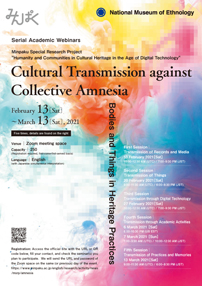Cultural Transmission against Collective Amnesia: Bodies and Things in Heritage Practices
Serial Academic Webinars
Cultural Transmission against Collective Amnesia: Bodies and Things in Heritage Practices

Humanity and Communities in Cultural Heritage in the Age of Digital Technology
| Date | Saturday, February 13 – Saturday, March 13, 2021 (Five times, details will be found below) |
|---|---|
| Venue | Zoom meeting space |
| Capacity | 250 (Registration required, first-come-first-served basis) |
| Language | English (with Japanese simultaneous interpretation) |
| Registration | Access the Google form below, complete your contact details, and check the seminar(s) you plan to join. We will send the Zoom URL and password on the same (or previous) day of the event. Registration form |
Due to the intensification of human settlement, structural change of cities, and technology enabling speed production and the destruction of the built environment, the modern world is said to suffer from collective amnesia (Connerton 2009). This issue is not just sociological but also personal, for our personal memory is closely linked to the environment where we act. For the same reason, resistance to collective amnesia by various kinds of groups takes place in different ways, from storytelling on the familial level to the editing formal history by governments.
This series of webinars will examine how memorizing practice contributes to so-called cultural transmission. Transmission practices have often been referred to in classic anthropological works because the repetition of habitual actions involved teaching younger generations in small societies based on face-to-face communication. In contemporary settings, however, the relevance of face-to-face communication has become so slight that we can no longer define cultural phenomena by presuming the socially simple settings mentioned above. “Culture” has even been appropriated to achieve different minorities’ political purposes so that its historical continuity is not a necessary condition anymore. Therefore, more attention to ephemeral phenomena is unavoidable. However, the other side of the same coin is also worth considering: the intentional practice of transgenerational transmission, and unintentional or ritual resistance to collective amnesia as a result.
Connerton, Paul 2009 How Modernity Forgets? Cambridge: Cambridge University Press.
Program
First Session: Transmission of Records and Media
Date: 13 February 2021 (Sat) 10:00 – 12:30 AM (UTC) / 7:00 – 9:30 PM (JST)
| Neil Carrier (Univ. of Bristol, UK) |
Visual Heritage and the City: Digital Technology and Nairobi Photographic Archives |
|---|---|
| Hiroshi Nawata (Akita University, Japan) |
Portrait Rights Issues and Photographic Archive of the Motoko Katakura Middle East Collections |
| Makito Minami (National Museum of Ethnology, Japan) |
Collaboration between Museums and the Source Community: Sharing Audio Materials of the Sarangi Music of the ’80s in Nepal |
Second Session: Transmission of Things
Date: 20 February 2021 (Sat) 9:00 – 11:30 AM (UTC) / 6:00 – 8:30 PM (JST)
Aromica Bhattacharya |
Reclaiming a Wooden Craft as Afro-Peruvian Musical Heritage |
|---|---|
| Yukako Yoshida (Tokyo University of Foreign Studies, Japan) |
Masks and Costumes in the Transmission of Balinese Performing Arts |
| Wakana Sato (Niigata University of International and Information Studies, Japan) |
Inheritance of Embroidery Techniques among Miao Women: Case Studies from the Guizhou Province, China |
Third Session: Transmission through Digital Technology
Date: 27 February 2021 (Sat) 10:00 – 12:30 AM (UTC) / 7:00 – 9:30 PM (JST)
| Graeme Were (University of Bristol, UK) |
Cultural Transmission in the Digital Age: Learning Kastom in New Ireland, Papua New Guinea |
|---|---|
| Rikutaro Manabe (University of Tokyo, Japan) |
Designing Participatory Community Archiving: How to Share Community Information through Digitization and Digital Tools |
| Taku Iida (National Museum of Ethnology, Japan) |
Making Museum Objects Revive in Human Societies: An Experience of an Image-Sharing Project between Africa and East Asia |
Fourth Session: Transmission through Academic Activities
Date: 6 March 2021 (Sat) 8:00 – 10:30 PM (US EST)
7 March 2021 (Sun) 1:00 – 3:30 AM (UTC) / 10:00 – 12:30 AM (JST)
|
Jon Kay (Indiana University, USA) |
Generativity, Heritage Practices, and the Well-being of Older Adults: How a University-based Folklore Program Helps Elders |
|---|---|
| Akira Matsuda (University of Tokyo, Japan) |
The Recent History of Ancient Burial Mounds in Japan |
| Daniel D. Saucedo Segami (Ritsumeikan University, Japan) Yuji Seki (National Museum of Ethnology, Japan) |
A Bridge between the Past and the Present: Cultural Heritage as a Mean to Build Social Memory in Peru |
Fifth Session: Transmission of Practices and Memories
Date: 13 March 2021 (Sat) 9:00 – 11:30 AM (UTC) / 6:00 – 8:30 PM (JST)
| Kati Lindstrom (KTH Royal Institute of Technology, Sweden) |
Does World Heritage Nomination Curb the Local Regeneration and Cultural Transmission of Practices? From World Heritage Nominations of Fuji-san and Sites of Meiji Industrial Revolution. |
|---|---|
| Eisuke Tanaka (Fukuoka Jo Gakuin University, Japan) |
“We are Turkish Nomads from Lycia:” The Changing Relationship between the Locals and Mountain Paths as ‘Heritage’ in the Context of Tourism in Teke Peninsula, South Turkey |
| Hironao Kawai (National Museum of Ethnology, Japan) |
Landscape Politics and Heritage Practices: Comparison between Fujian Tulow and Hakka Weilongwu |
